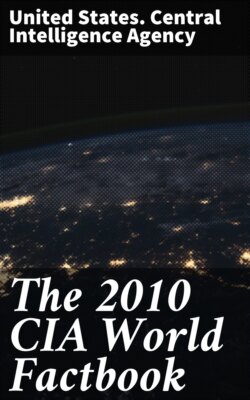Читать книгу The 2010 CIA World Factbook - United States. Central Intelligence Agency - Страница 385
На сайте Литреса книга снята с продажи.
Оглавление151 (2010) country comparison to the world: 36
Airports - with paved runways:
total: 39
2,438 to 3,047 m: 2
1,524 to 2,437 m: 2
914 to 1,523 m: 23
under 914 m: 12 (2010)
Airports - with unpaved runways:
total: 112
914 to 1,523 m: 18
under 914 m: 94 (2010)
Pipelines:
refined products 796 km (2009)
Railways:
total: 278 km country comparison to the world: 123 narrow gauge: 278 km 1.067-m gauge
note: none of the railway network is in use (2008)
Roadways:
total: 35,330 km country comparison to the world: 95 paved: 8,621 km
unpaved: 26,709 km (2004)
Waterways:
730 km (seasonally navigable by small craft) (2010) country comparison to the world: 75
Merchant marine:
total: 1 country comparison to the world: 160 by type: passenger/cargo 1 (2010)
Ports and terminals:
Caldera, Puerto Limon
Military ::Costa Rica
Military branches:
no regular military forces; Ministry of Public Security, Government, and Police (2010)
Manpower available for military service:
males age 16–49: 1,241,183
females age 16–49: 1,217,037 (2010 est.)
Manpower fit for military service:
males age 16–49: 1,044,923
females age 16–49: 1,026,432 (2010 est.)
Manpower reaching militarily significant age annually:
male: 42,486
female: 40,745 (2010 est.)
Military expenditures:
0.6% of GDP (2009) country comparison to the world: 155
Transnational Issues ::Costa Rica
Disputes - international:
the ICJ has given Costa Rica until January 2008 to reply and Nicaragua until July 2008 to rejoin before rendering its decision on the navigation, security, and commercial rights of Costa Rican vessels on the Rio San Juan over which Nicaragua retains sovereignty
Refugees and internally displaced persons:
refugees (country of origin): 9,699–11,500 (Colombia) (2007)
Illicit drugs:
transshipment country for cocaine and heroin from South America; illicit production of cannabis in remote areas; domestic cocaine consumption, particularly crack cocaine, is rising; significant consumption of amphetamines; seizures of smuggled cash in Costa Rica and at the main border crossing to enter Costa Rica from Nicaragua have risen in recent years (2008)
page last updated on January 12, 2011
======================================================================
@Cote d'Ivoire (Africa)
Introduction ::Cote d'Ivoire
Background:
Close ties to France since independence in 1960, the development of cocoa production for export, and foreign investment made Cote d'Ivoire one of the most prosperous of the West African states, but did not protect it from political turmoil. In December 1999, a military coup - the first ever in Cote d'Ivoire's history - overthrew the government. Junta leader Robert GUEI blatantly rigged elections held in late 2000 and declared himself the winner. Popular protest forced him to step aside and brought Laurent GBAGBO into power. Ivorian dissidents and disaffected members of the military launched a failed coup attempt in September 2002. Rebel forces claimed the northern half of the country, and in January 2003 were granted ministerial positions in a unity government under the auspices of the Linas-Marcoussis Peace Accord. President GBAGBO and rebel forces resumed implementation of the peace accord in December 2003 after a three-month stalemate, but issues that sparked the civil war, such as land reform and grounds for citizenship, remained unresolved. In March 2007 President GBAGBO and former New Force rebel leader Guillaume SORO signed the Ouagadougou Political Agreement. As a result of the agreement, SORO joined GBAGBO's government as Prime Minister and the two agreed to reunite the country by dismantling the zone of confidence separating North from South, integrate rebel forces into the national armed forces, and hold elections. Disarmament, demobilization, and reintegration of rebel forces have been problematic as rebels seek to enter the armed forces. Citizen identification and voter registration pose election difficulties, and balloting planned for November 2009 was postponed with no future date set. Several thousand UN troops and several hundred French remain in Cote d'Ivoire to help the parties implement their commitments and to support the peace process.
Geography ::Cote d'Ivoire
Location:
Western Africa, bordering the North Atlantic Ocean, between Ghana and Liberia
Geographic coordinates:
